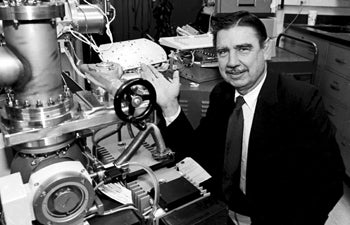In Memoriam: Darrell Judge, 79
Darrell Judge, professor emeritus of physics and astronomy and astronautical engineering at USC Dornsife, an expert in the fields of spectroscopy, space science and solar physics, and founding director of the USC Space Sciences Center, has died. He was 79.
Judge, of Warner Springs, California, died Aug. 26 at Temecula Valley Hospital due to complications arising from a car accident Aug. 15.
“He was the kindest, most lovable man on the planet,” said his daughter, Pamela Adamson. “His sense of humor was his trademark, which was wonderfully complemented by a rare combination of a brilliant scientific mind and humility.”
Werner Däppen, professor and chair of physics and astronomy, recalled Judge as a wonderful colleague and world-class scientist.
“He was an exceptional leader in the physics of the sun and the heliosphere,” Däppen said. “The USC Space Sciences Center he founded is equally known for carrying out state-of-the-art laboratory astrophysics and launching rockets that test instruments for space flights.”
Following graduate school at USC Dornsife in the mid-1960s, Judge taught in the Department of Physics and Astronomy for 48 years. As a teacher and mentor, Judge helped to establish the careers of many scientists and engineers in the areas of space science, solar physics and spectroscopy. He took great pleasure in working with his students, undergraduate and graduate, and his colleagues at USC, noted his wife of 55 years, Marjorie.
His areas of expertise extended to space exploration, atomic and molecular physics, ultraviolet imaging, deep space and sounding rockets, and star systems.
One of Judge’s greatest legacies is the USC Space Sciences Center (SSC), which he founded in 1978 to create new and multidisciplinary research opportunities for scientists and students and to help recruit top scientists. He was director of SSC from its inception until his retirement in May 2013.
SSC conducts deep space and research rocket flight experiments in order to investigate planetary atmospheres, the interplanetary medium — the material that fills the solar system — as well as the sun through remote-sensing optical techniques. Judge designed a number of unique instruments used for space flight missions funded by NASA, intended to observe the sun and monitor its extreme ultraviolet radiation levels. These instruments were on board the Pioneer 10 and 11 American space probes.
“Since Darrell’s science is about everything solar, from the surface outward, and mine is about the deep solar interior, I teasingly called him a ‘solar dermatologist,’ ” said Däppen. “I fondly recall how this remark made him laugh each time. Most importantly though, I remember Darrell as far more than an excellent scientist. He always struck me to be a tremendous human being, which was manifested not the least by a never-faltering commitment for the people he was responsible for.”

Judge at work in the lab at the USC Space Sciences Center (SSC) in 1989. He founded SSC in 1978 and directed it until his retirement in 2013. Photo by Irene Fertik, courtesy of USC University Archives.
Judge was a fellow in the American Physical Society and a member of the American Geophysical Union and the American Association for the Advancement of Science. His career yielded a number of awards, including three from NASA: an Exceptional Scientific Achievement Medal, a Group Achievement Award to the Pioneer 11 Saturn Mission Team, and a Public Service Group Achievement Award to the Pioneer 10 Scientific Instrument Team. He also received the prestigious Senior Scientist Humboldt Award from Germany.
Judge was born Nov. 2, 1934 in Albion, Illinois. He grew up in a teaching family: his father, Virgil, was superintendent of Edwards County Schools and later founded Lake Land Junior College in Mattoon, Illinois, and his mother Pauline was a longtime elementary school teacher. He met Marjorie at Cape Canaveral, Florida where both were employed at the Ramo-Woolridge Corporation (now TRW). The two were married in 1959.
Judge earned a bachelor’s degree in physics and mathematics with honors at Eastern Illinois State University before receiving a master’s in 1963 and Ph.D. in 1965 at USC Dornsife in physics.
As a boy, Judge spent summers on his grandfather’s farm in rural Illinois. Later, he rebuilt that dream for himself and his family on their 40 acres in Warner Springs and created a beautiful ranch complete with horses, tractors and a cabernet sauvignon vineyard.
“He loved restoring old tractors or hugging a horse’s neck and just being in the outdoors,” Adamson said. “He thoroughly enjoyed driving around the ranch on his golf cart with his dog on the seat next to him.”
Professor Mike Gruntman of USC Viterbi School of Engineering, founder of the USC Astronautics Program, recalled that many years ago Judge helped him to escape from the former Soviet Union and make the transition to the scientific community at USC.
“Darrell’s generosity, hospitality and friendship have touched the lives of many people, including mine,” Gruntman said. “As I started my life from scratch in the U.S., he warmly welcomed me to his group at USC and offered the hospitality of his home during my first week in Los Angeles. Darrell always encouraged me to pursue my scientific interests, which often diverged from his own.
“When I found a permanent home at USC Viterbi, our close scientific collaboration and friendship continued. As founding chairman of a new and unique space engineering department, I benefitted immensely from Darrell’s insight into administrative workings of the university.”
Judge is survived by his wife, Marjorie, daughters Pamela Adamson and Andrea Weinberg, son Kevin Judge, sister Jean Ann Becker, and five grandchildren.
A memorial is being planned for Sept. 6 in Temecula, California.
A scholarship fund has been established at USC Dornsife in honor of Darrell Judge. Donations may be addressed to USC Dornsife Advancement, memo: “Professor Darrell Judge,” 444 South Flower Street, 41st Floor, Los Angeles, CA 90071. Donations will go into a fund in Judge’s name.